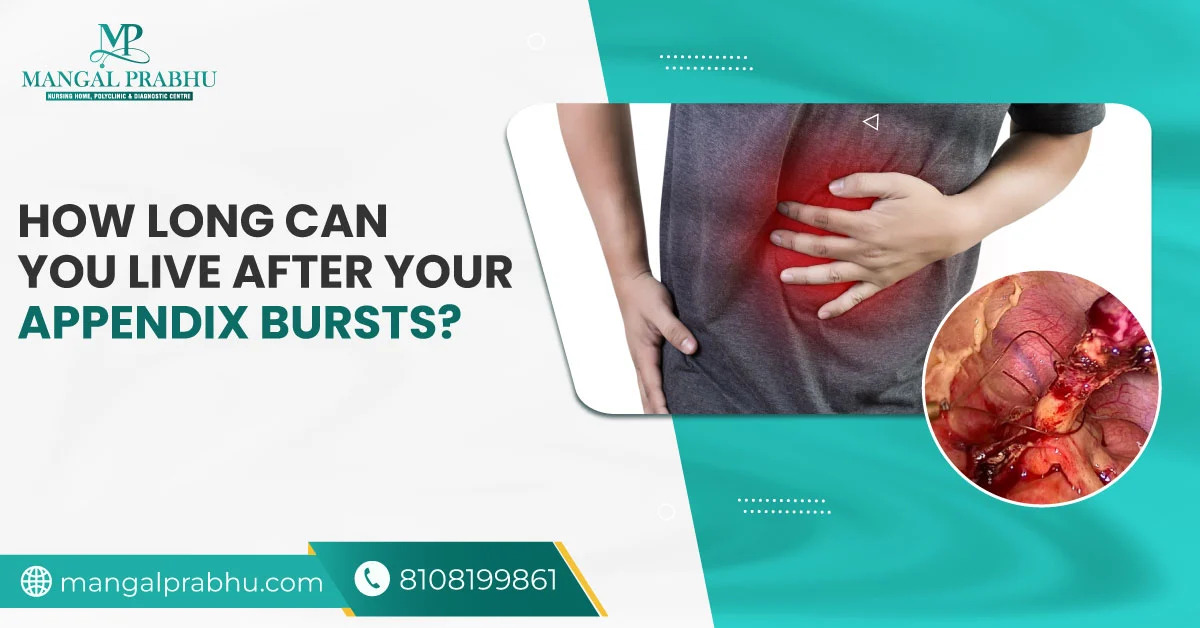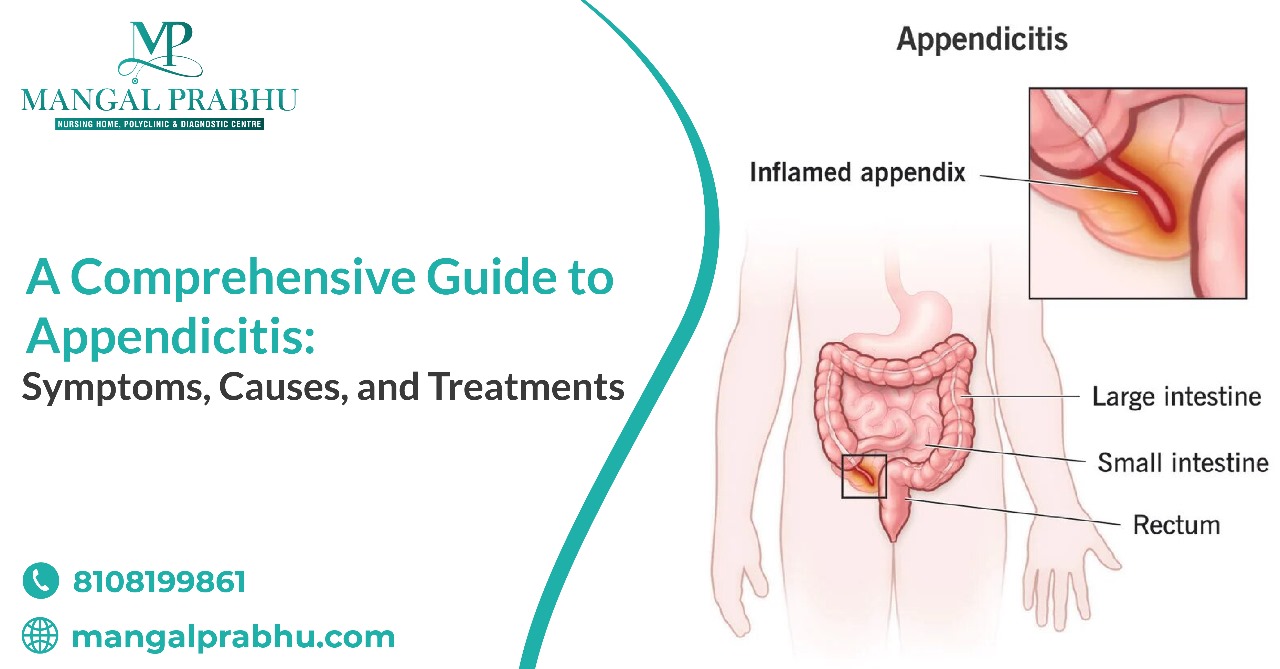
How Long Can You Live After Your Appendix Bursts?
Located on the lower right section of your belly, the appendix is a small finger-like organ. It can become inflamed, often necessitating immediate surgical removal. Appendicitis can escalate rapidly, leading to swelling and pus formation inside your appendix. Fortunately, the appendix doesn’t play a vital role in your body and can be removed safely. It’s advisable to consult a qualified appendix surgeon in Navi Mumbai to discuss your treatment options.
What Happens When Your Appendix Bursts?
Appendicitis, inflammation of the appendix, is a medical emergency and requires immediate care. If left untreated for a long time, the inflamed appendix can burst, and the infection can spread throughout your body. It’s a life-threatening condition that requires immediate surgical removal of your appendix.
The risk of appendix burst increases with time. The longer you delay the treatment for appendicitis, the higher the risk of a ruptured appendix. A ruptured appendix occurs when an infection spreads outside the appendix. If bacteria enter the appendix, they start multiplying, causing swelling. The infection keeps escalating until the swollen appendix bursts and the pus oozes out into the abdomen.
Recovery and Survival Rates After a Burst Appendix
A burst appendix can have serious complications, some of which are life-threatening. The mortality rate of perforated appendicitis is 4.8 percent. Treatment for a ruptured appendix depends on where it has spread. If there’s an abscess, you must take antibiotics to drain it.
The best appendix treatment in Navi Mumbai is open surgery, which gives the surgeon a clear view of the infection and its severity. Recovery can take up to 6 weeks. Your doctor will provide instructions to speed up your recovery. For instance, you will be advised to avoid heavy lifting or strenuous exercise that can put excess pressure on the incision site.
The recovery can take longer if the doctor has inserted tubes into your abdominal cavity for abscess drainage.
Long-Term Effects and Complications
As mentioned earlier, the biggest complication of a ruptured appendix is peritonitis, a condition in which the bacteria from the appendix enter your abdominal cavity, causing severe symptoms like excess abdominal pain, fever, chills, fast breathing, and confusion.
The appendix ruptures between 48 and 72 hours after the inflammation. The condition usually causes pain in the lower abdomen, starting around the navel and settling in the lower abdomen. Other symptoms of appendicitis include:
- Bloating in your abdomen
- Difficulty passing gas
- Nausea and vomiting
- Pain in the belly while walking, climbing stairs, jumping, and practicing other physical activities.
A ruptured appendix can lead to sepsis or an abscess (a pocket of pus forming inside your abdominal cavity). The abscess needs to be drained through a tube inserted into your abdomen. Your doctor will prescribe antibiotics to clear the fluid.
If you have developed an abscess, your doctor will wait until it is drained completely before performing appendix removal surgery.
The burst appendix is an emergency. Your recovery and the survival rates for appendicitis depend on how soon you get the treatment. The condition requires quick diagnosis and immediate treatment to prevent complications.

A Comprehensive Guide to Appendicitis: Symptoms, Causes, and Treatments
Introduction to Appendicitis
Appendicitis is a medical emergency when the appendix, a small, finger-like organ in the lower right side of the abdomen, becomes inflamed and infected. This condition can be extremely painful and, if left untreated, may lead to severe complications. This guide will explore the symptoms, causes, treatments, and prevention of appendicitis. If you’re in Navi Mumbai and require appendicitis treatment, it’s crucial to consult a skilled general surgeon in Navi Mumbai, such as those at Mangal Prabhu Hospital, who can provide timely and effective care.
Symptoms of Appendicitis
Recognizing the symptoms of appendicitis is essential for early diagnosis and prompt treatment. Common symptoms include:
i) Abdominal Pain
The most typical sign of appendicitis is a sharp pain that starts around the navel and gradually moves to the lower right abdomen. This pain often intensifies over time.
ii) Nausea and Vomiting
Many individuals with appendicitis experience nausea and may vomit due to the pain and discomfort.
iii) Loss of Appetite
A sudden loss of appetite is common when the appendix is inflamed.
iv) Fever
Appendicitis can lead to a low-grade fever, which may become more severe as the condition progresses.
v) Constipation or Diarrhea
Changes in bowel habits can occur, often with the patient experiencing either constipation or diarrhea.
vi) Abdominal Tenderness
The area around the appendix becomes tender and painful to the touch.
vii) Inability to Pass Gas
Some people with appendicitis find it difficult to pass gas.
Also Read: How To Reduce Appendix Pain?
Causes of Appendicitis
The exact cause of appendicitis is not always clear, but it is believed to result from one or more of the following factors:
a) Obstruction
Most cases of appendicitis are associated with a blockage in the appendix, often caused by stool, foreign objects, or an infection.
b) Infection
Infections within the digestive tract can lead to inflammation of the appendix.
c) Enlarged Lymphoid Follicles
Lymphoid tissue in the appendix can enlarge and lead to obstruction.
Treatments for Appendicitis
The standard treatment for appendicitis is surgical removal of the inflamed appendix, a procedure known as an appendectomy. This surgery can be performed using either traditional open or laparoscopic surgery, which is less invasive and typically results in a quicker recovery.
In some cases, if the appendix has formed an abscess (a pocket of infection), it may be drained before removing it surgically. It may involve a temporary drainage tube placement.
Prompt surgical intervention is crucial to prevent the appendix from rupturing, which can lead to severe complications, including peritonitis, a life-threatening infection of the abdominal lining.
Prevention of Appendicitis
- While appendicitis cannot always be prevented, some strategies may reduce the risk:
- Consuming a diet high in fiber may help prevent blockages in the appendix.
- Staying well-hydrated can help maintain healthy bowel function.
- Regular physical activity can promote overall digestive health.
- Practicing good hygiene, including regular handwashing, may reduce the risk of infection.
Conclusion
Appendicitis is a painful condition that requires prompt medical attention. You must consult a healthcare professional immediately if you experience symptoms like abdominal pain, nausea, vomiting, or fever. At Mangal Prabhu Hospital in Navi Mumbai, you can find experienced general surgeons who specialize in appendicitis treatment in Navi Mumbai. Early diagnosis and timely appendectomy are critical to a successful recovery and preventing complications. By understanding the symptoms, causes, and treatments of appendicitis, you can take the necessary steps to protect your health and well-being.
